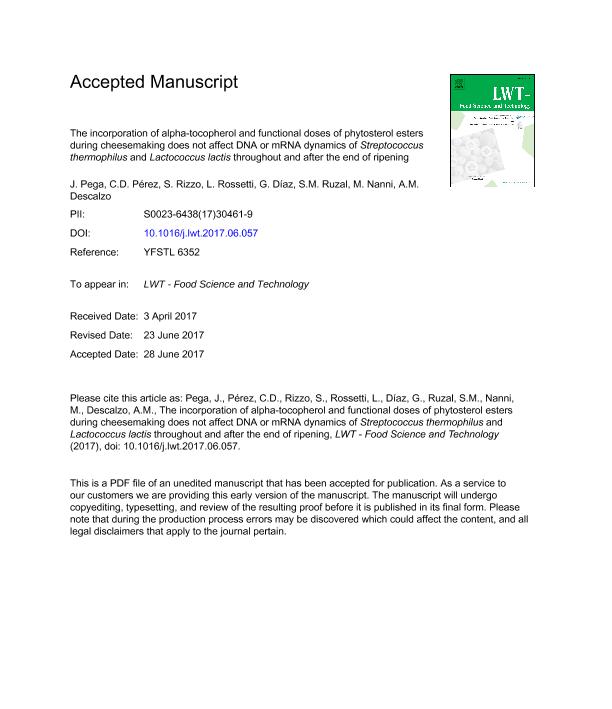Mostrar el registro sencillo del ítem
dc.contributor.author
Pega, Juan Franco

dc.contributor.author
Pérez, Carolina Daiana

dc.contributor.author
Rizzo, Sergio Anibal

dc.contributor.author
Rossetti, Luciana

dc.contributor.author
Diaz, G.
dc.contributor.author
Ruzal, Sandra Mónica

dc.contributor.author
Nanni, M.
dc.contributor.author
Descalzo, Adriana Maria

dc.date.available
2018-04-23T18:01:47Z
dc.date.issued
2017-10
dc.identifier.citation
Pega, Juan Franco; Pérez, Carolina Daiana; Rizzo, Sergio Anibal; Rossetti, Luciana; Diaz, G.; et al.; The incorporation of alpha-tocopherol and functional doses of phytosterol esters during cheesemaking does not affect DNA or mRNA dynamics of Streptococcus thermophilus and Lactococcus lactis throughout and after the end of ripening; Elsevier Science; LWT - Food Science and Technology; 84; 10-2017; 838-841
dc.identifier.issn
0023-6438
dc.identifier.uri
http://hdl.handle.net/11336/43055
dc.description.abstract
Tocopherols and phytosterols are lipid-soluble molecules which have been widely used in the food industry. Nevertheless, the influence of these compounds on the performance of starter lactic acid bacteria (SLAB) in fermented foods has received little attention. Here, we assessed the behavior of Streptococcus thermophilus and Lactococcus lactis during the ripening of a functional Port Salut light cheese elaborated with these SLAB and with alpha-tocopherol and phytosterol esters as bioactive molecules. Functional and control cheeses were manufactured at an industrial plant and sampled at 7, 21, 40, 60 and 90 days after elaboration for real-time quantitative PCR (qPCR) or reverse transcription-qPCR (RT-qPCR) experiments. Target DNA and mRNA from both SLAB were detected after 90 days of elaboration in both functional and control cheeses, supporting their potential role in generating flavor metabolites. Furthermore, here we showed for the first time that the addition of alpha-tocopherol and functional doses of phytosterols did not affect DNA or mRNA dynamics of these SLAB during cheesemaking, throughout and after the end of ripening. Therefore, our results support the use of cheese manufactured with both S. thermophilus and L. lactis as an optimal delivery system for these beneficial bioactive compounds.
dc.format
application/pdf
dc.language.iso
eng
dc.publisher
Elsevier Science

dc.rights
info:eu-repo/semantics/embargoedAccess
dc.rights.uri
https://creativecommons.org/licenses/by-nc-nd/2.5/ar/
dc.subject
Streptococcus Thermophilus
dc.subject
Lactococcus Lactis
dc.subject
Functional Food
dc.subject
Rt-Qpcr
dc.subject
Qpcr
dc.subject.classification
Alimentos y Bebidas

dc.subject.classification
Otras Ingenierías y Tecnologías

dc.subject.classification
INGENIERÍAS Y TECNOLOGÍAS

dc.title
The incorporation of alpha-tocopherol and functional doses of phytosterol esters during cheesemaking does not affect DNA or mRNA dynamics of Streptococcus thermophilus and Lactococcus lactis throughout and after the end of ripening
dc.type
info:eu-repo/semantics/article
dc.type
info:ar-repo/semantics/artículo
dc.type
info:eu-repo/semantics/publishedVersion
dc.date.updated
2018-04-09T16:10:21Z
dc.journal.volume
84
dc.journal.pagination
838-841
dc.journal.pais
Países Bajos

dc.journal.ciudad
Amsterdam
dc.description.fil
Fil: Pega, Juan Franco. Instituto Nacional de Tecnología Agropecuaria. Centro de Investigación de Agroindustria. Instituto de Tecnología de Alimentos; Argentina. Consejo Nacional de Investigaciones Científicas y Técnicas. Oficina de Coordinación Administrativa Ciudad Universitaria. Instituto de Química Biológica de la Facultad de Ciencias Exactas y Naturales. Universidad de Buenos Aires. Facultad de Ciencias Exactas y Naturales. Instituto de Química Biológica de la Facultad de Ciencias Exactas y Naturales; Argentina
dc.description.fil
Fil: Pérez, Carolina Daiana. Instituto Nacional de Tecnología Agropecuaria. Centro de Investigación de Agroindustria. Instituto de Tecnología de Alimentos; Argentina. Consejo Nacional de Investigaciones Científicas y Técnicas. Oficina de Coordinación Administrativa Ciudad Universitaria. Instituto de Química Biológica de la Facultad de Ciencias Exactas y Naturales. Universidad de Buenos Aires. Facultad de Ciencias Exactas y Naturales. Instituto de Química Biológica de la Facultad de Ciencias Exactas y Naturales; Argentina
dc.description.fil
Fil: Rizzo, Sergio Anibal. Instituto Nacional de Tecnología Agropecuaria. Centro de Investigación de Agroindustria. Instituto de Tecnología de Alimentos; Argentina
dc.description.fil
Fil: Rossetti, Luciana. Instituto Nacional de Tecnología Agropecuaria. Centro de Investigación de Agroindustria. Instituto de Tecnología de Alimentos; Argentina
dc.description.fil
Fil: Diaz, G.. Instituto Nacional de Tecnología Agropecuaria. Centro de Investigación de Agroindustria. Instituto de Tecnología de Alimentos; Argentina
dc.description.fil
Fil: Ruzal, Sandra Mónica. Consejo Nacional de Investigaciones Científicas y Técnicas; Argentina
dc.description.fil
Fil: Nanni, M.. Instituto Nacional de Tecnología Agropecuaria. Centro de Investigación de Agroindustria. Instituto de Tecnología de Alimentos; Argentina
dc.description.fil
Fil: Descalzo, Adriana Maria. Instituto Nacional de Tecnología Agropecuaria. Centro de Investigación de Agroindustria. Instituto de Tecnología de Alimentos; Argentina. Centre de Coopération Internationale en Recherche Agronomique pour le Développerment; Francia. Consejo Nacional de Investigaciones Científicas y Técnicas; Argentina
dc.journal.title
LWT - Food Science and Technology

dc.rights.embargoDate
2018-05-01
dc.relation.alternativeid
info:eu-repo/semantics/altIdentifier/doi/http://dx.doi.org/10.1016/j.lwt.2017.06.057
dc.relation.alternativeid
info:eu-repo/semantics/altIdentifier/url/https://www.sciencedirect.com/science/article/pii/S0023643817304619
Archivos asociados
